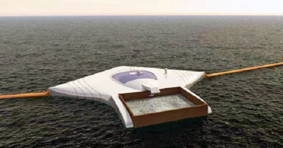 Cleanzine: your weekly cleaning and hygiene industry newsletter 18th April 2024 Issue no. 1110
Cleanzine: your weekly cleaning and hygiene industry newsletter 18th April 2024 Issue no. 1110
Your industry news - first
The original and best - for over 20 years!
We strongly recommend viewing Cleanzine full size in your web browser. Click our masthead above to visit our website version.
Welcome to the
![]()
Cleanzine - the original Cleaning & Hygiene industry e-news
Read by industry professionals in 148 countries worldwide!
It’s many months since I last received information about Electrolux’s ‘Vacs from the Sea’ initiative, whereby the company manufactured a striking range of vacuum cleaners from plastic waste that had been floating around in the sea. This pollution really worries me and as a keen recycler, I loved the idea of what Electrolux was doing to highlight the problems our oceans – and all that live in it – face, while showing what can be achieved in terms of product design using recycled materials. I was naturally disappointed that I appeared to have exhausted all my options when it came to covering the initiative in my Cleanzine musings…
I’m delighted to see then, that 19-year-old Boyan Slat has taken up the ‘ocean clean-up’ baton, with his network of floating booms and processing platforms that can be dispatched to garbage patches around the world to salvage the waste. Instead of moving through the ocean, the anchored ‘arrays’, as they are known, span the radius of the patch, acting as a giant funnel. The angle of the booms forces plastic in the direction of the platforms, where it is separated from plankton, filtered, and stored for recycling.

Boyan first started developing the concept while at school, fine-tuning it over the years and going on to found The Ocean Cleanup Foundation, a non-profit organisation which is responsible for the development of his proposed technologies. His ingenious solution could potentially save hundreds of thousands of aquatic animals annually and reduce pollutants (including PCB and DDT) from building up in the food chain. It could also save millions per year, both in clean-up costs, lost tourism and damage to marine vessels.
It’s estimated that the clean-up process will take about five years.
You can learn more here and no doubt learn more about the possibility of sponsoring this wonderful initiative here
 Please get in touch either by emailing me or posting a comment on our Facebook page. www.facebook.com/Cleanzine
Please get in touch either by emailing me or posting a comment on our Facebook page. www.facebook.com/Cleanzine
![]() You can also follow us on Twitter @cleanzine
You can also follow us on Twitter @cleanzine
Yours,

24th April 2014







